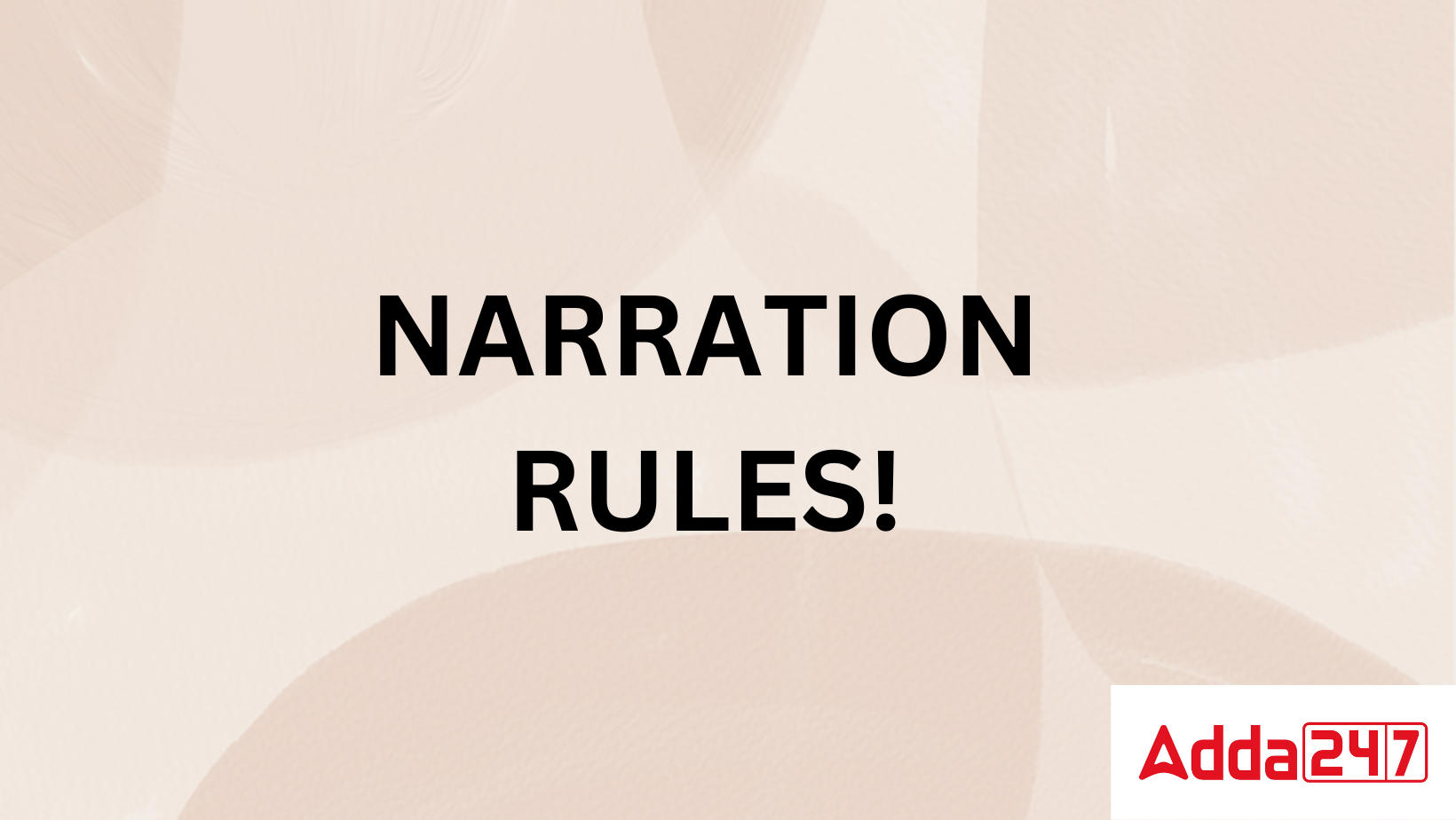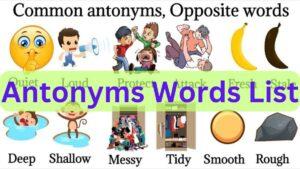Table of Contents
Narration is the art of telling a story, guiding the audience through a sequence of events, experiences, or ideas. It can take various forms, including first-person, second-person, and third-person perspectives, each offering a unique way to engage the reader. A well-crafted narration not only conveys the plot but also delves into characters’ emotions, settings, and underlying themes. Through narration, writers can immerse readers in different worlds, making them feel connected to the story. It is a fundamental aspect of literature and communication, used to share information, evoke emotions, and provoke thought.
Narration
As the title suggests, the narration is the act of telling someone else what one has heard. The sentence structure varies depending on the narration chart or method of speaking. It can be spoken directly, which is known as direct speech, or indirectly, which is known as reported speech. An excellent strategy to understand this area of English grammar is to use the narrative rules and the direct and indirect speaking rules.
Narration Rules
Let’s take a look at simple narration rules that will make it easier for us to comprehend the guidelines for changing one type to the other. This chart’s fundamental feature is that it calls for comprehension of the Subject noun, pronoun, reporting verb, speech clause, and conjunction.
Narration Change Rules 1: The first rule is to select a reporting verb and time frame or tense in the sentence.
-
What time did the speech take place? The reporting verb is in the present tense when dealing with current, repeated, or recent events. “He says he’s hungry, so let’s grab a bite to eat.”
-
Choose the past tense for recounting a less recent speech. Depending on the situation, the reporting verb can also be told, or other verbs such as ordered, stated, or reported. You can use verbs like asked or requested when reporting queries.
Narration Change Rules 2. The second rule is to alter your point of view.
That is, I transform into he, she, or they. Karan said, “I drank the orange juice.” becomes, “Karan said that he drank the orange juice.”
The girls said, “We are going tomorrow.’’ becomes, “They said they are going tomorrow.”
Narration Change Rules 3. Decide whether or not to use “if” or “that.”
It’s a choice when reporting on a question, another conjunction, if, is required or not.
She asked, ”Do you know how to play tennis.”
“She asked me if I knew how to play tennis.”
Narration Change Rules 4. Move the tense Backward, if the sentence is in the present tense, then the Reporting verb will be in the past tense.
Example: Karina said, “I have repaired my bicycle.”
Karina said she had repaired her bicycle.
Narration in English Grammar
Creating a chart that summarizes the rules of narration (or reported speech) can be incredibly helpful for understanding how to convert direct speech into indirect speech. Here’s an overview of the key rules:
Narration Rules Chart
Narration Rules Chart is given below here. It will help Student in understand all the narration Rules.
| Aspect | Direct Speech | Indirect Speech (Reported Speech) |
|---|---|---|
| Tenses | Present tense verbs often change to the past tense. | – Present Simple to Past Simple
– Present Continuous to Past Continuous – Present Perfect to Past Perfect – Will to Would |
| Pronouns | First and second person pronouns often change to third person. | “I”, “we” may change to “he”, “she”, “they” depending on the context. |
| Time and Place | Words indicating time and place are changed to suit the time and place of reporting. | – “Now” to “then”
– “Today” to “that day” – “Tomorrow” to “the next day”/”the following day” – “Yesterday” to “the day before”/”the previous day” – “Here” to “there” |
| Questions | Question structure is changed to a statement format. | Use “if” or “whether” for yes/no questions. Question words (who, what, when, etc.) are kept. |
| Commands and Requests | Imperative sentences are changed to infinitive form. | Use verbs like “asked” or “told” followed by “to” + verb. |
| Exclamations and Wishes | Exclamatory sentences are changed to statement form. | Use expressions like “exclaimed that”, “wished that”, etc. |
| Modals | Modal verbs can change. | – “Can” to “could”
– “Will” to “would” – “May” to “might” |
| Reporting Verbs | Say, ask, exclaim and other verbs are adjusted based on the type of speech. | The tense of the reporting verb may change based on the overall sentence tense. |
Write General Rules for Changing Narration
some general rules for changing narration, typically from direct to indirect speech:
1. Remove Quotation Marks
In indirect speech, omit the quotation marks around the spoken words.
2. Change of Pronouns
Pronouns often change depending on the subject and object of the reporting verb.
For example, “I” might change to “he” or “she” based on the context.
3. Adjust Verb Tenses
Generally, the tense shifts one step back in indirect speech.
Present Simple becomes Past Simple
Present Continuous becomes Past Continuous
Present Perfect becomes Past Perfect
Exceptions:
If the reporting verb is in the present or future tense, the tense of the reported speech often remains unchanged.
Tenses don’t change if reporting a universal truth or a habitual action.
4. Change Time Expressions
Words related to time and place often change.
“now” becomes “then”
“today” becomes “that day”
“tomorrow” becomes “the next day” or “the following day”
“yesterday” becomes “the previous day” or “the day before”
5. Change Modals Where Necessary
Certain modal verbs change to their past forms.
“can” becomes “could”
“may” becomes “might”
“will” becomes “would”
Modals like “must” may become “had to,” but if “must” refers to a logical deduction or certainty, it might stay the same.
6. No Change with Certain Modals and Verbs
Would, could, should, might, and ought to generally remain unchanged.
7. Questions in Narration
When reporting questions, change the question format to a statement.
Yes/no questions are introduced by if or whether.
For Wh-questions, keep the question word but follow the subject-verb order.
Remove any question marks.
8. Imperative Sentences
Imperative sentences (orders, requests) are often reported with verbs like asked, requested, ordered, or advised.
The verb in the reported speech is usually changed to an infinitive form, for example:
Direct: “Close the door,” he said.
Indirect: He asked me to close the door.
9. Exclamations
Exclamatory sentences are reported using phrases like exclaimed with joy, exclaimed with regret, or wished (for certain types of exclamations).
Convert the exclamation to a statement format.
10. Reporting Verb Variations
The reporting verb (said, told, asked, etc.) may change to indicate the tone or intent of the original speech, depending on context.
Examples:
Direct: He said, “I am going to the store now.”
Indirect: He said that he was going to the store then.
Direct: She asked, “Do you like the movie?”
Indirect: She asked if I liked the movie.
These are foundational rules, but context and intention play a role in narration changes, so apply them with flexibility based on sentence meaning.
Narration Change Rules for Tense in English Grammar
The following table shows all the narration rules which shows you the change of tenses:
| Simple Present to Simple Past |
| Present Continuous to Past Continuous |
| Present Perfect to Past Perfect |
| Present Perfect Continuous to Past Perfect Continuous |
| Past Indefinite/Simple to Past Perfect |
| Past Continuous to Past Perfect Continuous |
| Future Tense (will/shall) to Future in Past (would/should) |
| Past Perfect Tense: No change |
Narration Rules for Interrogative Sentences
- The reporting verb said/ said to will be changed into asked/ enquired/ demanded/ ordered as per the nature of the sentence.
- If a sentence starts with reporting verb then at the conversion time if/whether will be used.
- In case of the sentence starts from ‘wh’ question word then question word will be considered as the conjunction.
Narration Rules with Time and Place Words Table
| Now | Then |
| Today | That day |
| Here | There |
| This | That |
| This week | That week |
| Tomorrow | The following day/ Next day |
| Next week | Following week |
| Yesterday | The previous day |
| Last week | The previous week |
| Ago | Previously/ Before |
| Tonight | That night |
| I | He/She |
| You | He/She/They |
| We | They |
| They | They |
| He | He |
| She | She |
| It | It |
| Us | Them |
| Our | Their |
| His | His |
| Her | Her |
| Its | Its |
Narration Rules for Universal Truth
These are te following narration rules that will be implied for universal truth or habitual actions
- If the reported speech states some universal truth, proverbs, historical events in the past then the present tense used in the sentence will not change into corresponding past tense.
- The Past Indefinite Tense or the Past Continuous Tense is not changed if the Reported Speech states two actions which took place at the same time.
- The Simple Past is not changed if the Reported Speech states a past historical event or fact.
- Vocative and nominative of address are omitted altogether and their sense is expressed in the sentence.
- Past tense subjunctive after would like, would rather, etc. do not change.
- Pure imaginary conditions (if …. were clauses) do not change.
- Simple Past or Past Continuous tense in Time Clauses do not normally change. The main verb may either remain unchanged or may become the past perfect.
Narration Rules Examples
Narration, in English grammar, refers to the way in which we report what someone has said. It involves two primary types: direct and indirect (reported) speech. Here are examples of each, demonstrating how the same information can be conveyed differently:
Direct Speech
Direct speech gives the exact words spoken by the person, enclosed in quotation marks.
- Statement:
- Direct: John said, “I am going to the store.”
- Question:
- Direct: She asked, “Do you like chocolate?”
- Command or Request:
- Direct: The teacher said, “Please open your books to page 20.”
- Exclamation:
- Direct: He exclaimed, “What a wonderful surprise!”
Indirect (Reported) Speech
Indirect speech paraphrases what someone said without quoting them exactly, often involving changes in tense, pronouns, and time/place words.
- Statement:
- Indirect: John said that he was going to the store.
- Question:
- Indirect: She asked if I liked chocolate.
- Note: The question form is changed to a statement form.
- Indirect: She asked if I liked chocolate.
- Command or Request:
- Indirect: The teacher asked us to open our books to page 20.
- Note: The imperative form is often changed to the infinitive form (‘to’ + verb).
- Indirect: The teacher asked us to open our books to page 20.
- Exclamation:
- Indirect: He exclaimed that it was a wonderful surprise.
These examples illustrate the differences in structure and wording between direct and indirect speech. The key in indirect speech is to maintain the original meaning while adjusting the grammatical structure and pronouns as needed to fit the context of the reporting.
Examples of Narration Rules
- Direct Speech: Shabab says, “I eat an egg a day.”
- Indirect Speech: Shabab says that he eats an egg a day.
- Direct Speech: Matin said, “I bought the book yesterday.”
- Indirect Speech: Matin said that he had bought the book the previous day. (Here, “yesterday” is converted into “the previous day”. It can also be written as “the day before”.)
- Direct Speech: Samantha said, “I shall leave for London tomorrow.”
- Indirect Speech: Samantha said that she would leave for London the next day. (You can also use “the following day” for replacing “tomorrow” in indirect speech.)
- Direct Speech: They said, “We have watched the movie already.”
- Indirect Speech: They said that they had watched the movie already.
Narration Rules Exercise in English Grammar
Here are some questions to solve for narration.
- She said to me ,” I like you very much.”
- I said to her,” Why do you like me ?”
- Rudra said to Kinjal,” Are you stupid ?”
- Kinjal said to her father,” Bring me a car.”
- John said to me ,” Do you know where he is ?”
- She said,” What a tall boy you are !”
- The students said,” Alas ! We are fail again.”
- Kinjal said ,” Hurrah ! I have won the scholarship “
- The teacher says,” Rose smells sweet .”
- I said to him,” When I went there, he was sleeping.”
- She said to me,” I had been waiting for you for two hours.”
- I said,” Well, you have completed this task.”
- Jessy said to Harley,” May I borrow your book?”
- I said to my teacher,” Good morning, sir.”
- Mona said to me,” You know me, don’t you?
Solution to these questions
- She told me that she liked me very much.
- I asked her why she liked me.
- Rudra asked Kinjal if she was stupid.
- Kinjal asked her father to bring her a car.
- John asked me if I knew where he was.
- She exclaimed with wonder that you were a very tall boy. or she exclaimed with surprise that I was a very tall boy. ( Note – ‘You’ pronoun can be changed either in you or I or He/ She because the reporter ‘she’ can talk to anybody.)
- The students exclaimed with sorrow that they were fail again.
- Kinjal exclaimed with joy that she had won the scholarship.
- The teacher says that Rose smells sweet. ( General Truth, No Change of Tense in the Reported Speech )
- I told him that when I went there, he was sleeping. ( Note – If in both the parts of a sentence, there are sentences of past tense, we don’t change them. )
- She told me that she had been waiting for you for two hours.
- I said that you/he/she had completed that task.
- Jessy asked Harley If she might borrow his book.
- I wished good morning to my sir or I wished my sir good morning.
- Mona asked me If I knew her.



 Most Repeated Questions from Class 10 En...
Most Repeated Questions from Class 10 En...
 Republic Day Speech In English 2025, 26 ...
Republic Day Speech In English 2025, 26 ...
 500+ Antonyms Words List for Kids, Downl...
500+ Antonyms Words List for Kids, Downl...










